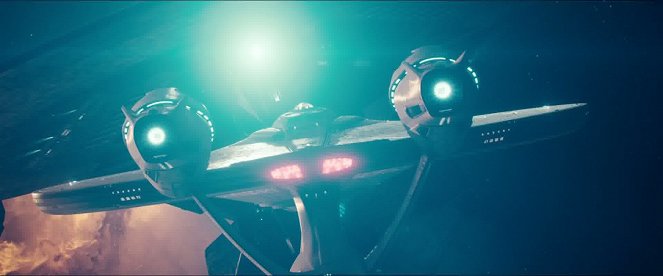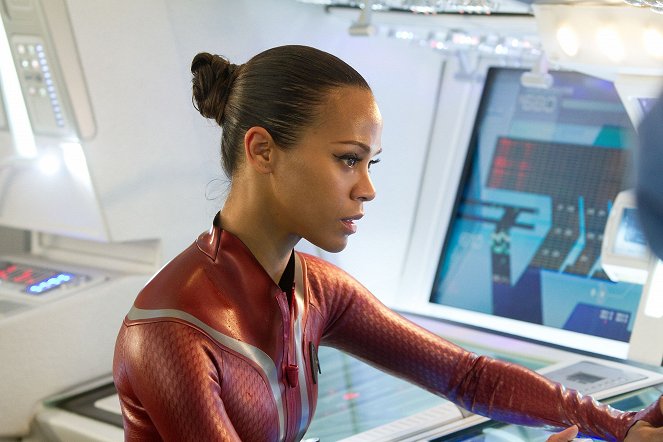Regie:
J.J. AbramsKamera:
Dan MindelMusik:
Michael GiacchinoBesetzung:
Chris Pine, Zachary Quinto, Zoe Saldana, Karl Urban, Simon Pegg, John Cho, Benedict Cumberbatch, Anton Yelchin, Bruce Greenwood, Peter Weller, Alice Eve (mehr)Inhalte(1)
Nach einem Anschlag auf das Waffenlabor der Sternenflotte in London mit mehreren Toten wird der Oberste Rat zu einer Sitzung einberufen. Auch Kirk, Spock und Admiral Pike nehmen daran teil. Gerade als der Admiral den Namen des Attentäters John Harrison verkündet, greift dieser das Gebäude an. Harrison kann fliehen, doch die Crew der Enterprise macht Jagd auf ihn. (ProSieben)
(mehr)Videos (36)
Kritiken (14)
Sagen Sie mir, dass das funktioniert! – Ich habe weder die Information, noch die Zuversicht. Na ja, zum Glück hat dieser Film aber gut funktioniert. Eigentlich mehr als gut. Das Drehbuch erlaubt sich beim Spielen mit dem parallelen Star-Trek-Universum noch mehr als beim letzten Mal, die technische Seite ist einwandfrei und die Regie von J. J. Abrams wie alle Schauspieler*innen – perfekt. Manchmal ist es witzig, manchmal dramatisch, manchmal intim rührend… Und die Änderungen des Tempos wirken nie unpassend, was bewundernswert ist. Bei der Schauspielbesetzung wird völlig zu Recht Benedict Cumberbatch hervorgehoben, dessen Schuft in der zeitgenössischen Kinematografie kaum einen Konkurrenten finden würde (ich grüße den peinlichen Loki aus Avengers und viele andere). Der beste Teil des Films ist wahrscheinlich der Abschnitt, der mit dem Treffen von zwei Schiffen beginnt, mit Scotts witziger Mission und dem Umsteigen von einem Schiff aufs andere fortsetzt und mit der "Enthüllung“ endet. Die Verfolgung am Anfang, welche wie aus Indiana Jones - Jäger des verlorenen Schatzes aussieht, hat mir aber auch sehr gefallen. Michael Giacchino ist es gelungen, das ausgezeichnete Niveau der Musik vom vorigen Teil beizubehalten. Apropos Spock, das ist wahrscheinlich der einzige Schwachpunkt des Films. Nicht der "neue“, der von Zachary Quinto gespielt wird, sondern der gute alte Leonard Nimoy, der wieder da ist. Dieses Mal wirkt er aber ziemlich unnatürlich und hat einen überflüssigen "Deus-Ex-Machina-Charakter“. Aber wie schon gesagt, es ist der einzige Makel.
()
Ich vermag da kaum vom emotionalen Faktor abstrahieren, weil ich mich wie bei der vorherigen Folge wie zu Hause gefühlt und Abrams modernisierte Poetik einer Art rigider Föderation sowie der weniger angespannt wirkenden Besatzung des Raumschiffs Enterprise in vollen Zügen genossen habe. Gewissermaßen kommt der Flug in die Dunkelheit etwas weniger souverän herüber als der Vorgänger - jener war nämlich für einen Prolog untypisch lebhaft, funktional, dynamisch gut verknüpft und clever. Es wurden hier die Grundlagen einer neuen Mythologie geschaffen, der alten wurde hier Tribut gezollt, und sparsam die neue Chemie der Charaktere zusammengemischt. Die nächste Folge kämpft da doch etwas mehr mit der Erklärung einiger Motivationen und Ereignisse, wobei Deus ex machina oder einer Referenz außerhalb der Filmwelt (zu Dem Zorn des Khan, zur Serienepisode Der schlafende Tiger, zu Abrams erstem ST, zum dazugehörigen Comics usw.) als letzte Instanz übrig bleibt. Dementsprechend kann Into the Darkness Nerdenzyklopädie mit dürrer Logik erscheinen. Bis zu einem gewissen Maße stimme ich dem, allerdings sofern die gelegentliche Naivität, den erfolglosen Dialog und einer gewissen Dürrheit (oder eher das Meiden) seitens des Drehbuchs wegabstrahieren, funktioniert der Film einfach gut. Er verwendet etablierte Motive elegant, interpretiert vertraute Ereignisse geschickt unter dem Gesinchtspunkt der "veränderten Realität" neu, ohne zu vergessen, mit dem Schlüsselelement des neuen ST zu arbeiten: der Beziehung zwischen Kirk und Spock. In vielerlei Hinsicht bringt der Film sie näher aneinander (väterliches Motiv, Wut), wirkt dabei jedoch nicht als bloßes Derivat des ursprünglichen Filmduos. Cumberbatch in der Rolle des Khan stellt wahrscheinlich die erfolgreichste Transkription dar - es ist ihm hervorragend gelungen, eine gewisse menschliche Zerbrechlichkeit mit der Theatralik Ricardo Montalbans zu kombinieren, zeitgleich funktioniert dies auch als Katalysator: In gewisser Hinsicht nähert er sich Spock an (überlegene körperliche und geistige Fähigkeiten), in einigen Dingen wiederum Kirk (offensichtliches Interesse an Improvisation und Problemen mit Selbstkontrolle und Ordnung), jedenfalls werden in eine Situation gebracht, wo sie ihre grundlegenden Ansichten und Betrachtungsweisen des Dienstes überdenken müssen. Glücklicherweise erinnert er in keinster Weise an die "destruktiven schicksalhaften" Bösewichte, die Christopher Nolan so meisterhaft konstruiert hat, sondern er es ist im Kern ja eigentlich altmodisch (die gute altmodische Rache). Der neue ST ist in allererster Linie eine Attraktion. Manchmal scheint es, dass die einst obsessive Vorliebe im ins Detail Ausdenken und Ausmalen, wofür die Star Trek Serien bekannt ist, gewichen ist und durch reine Dynamik ersetzt wurde. Dennoch ist es nahezu ein kindhaftes Vergnügen, den Einfallsreichtums sowie die Dynamik oft paralleler sowie präzise konstruierter Handlungen zu beobachten. Ebenso, wie es ist, wenn wir die Anströme von Nostalgie aus vertrauten Szenen wahrzunehmen, die erneut aufleuchten und trotz eines gewissen rationalen Kalküls immer noch funktionieren und die neue Geschichte bereichern. Es ist ein Film, in dem meiner Ansicht nach alles vorhanden ist. Manchmal wirkt es ein wenig mysteriös, wie es denn dahin gekommen ist, jedoch ST bietet einfach genug dafür, damit ein in Roddenberrys Welt erzogener Zuschauer sich damit abfindet.
()
(weniger)
(mehr)
Massive disappointment from J.J. Abrams, the first time ever. Effective eye candy, but it didn’t bring me any pleasure at all. The story is told so sloppily that I actually don’t know what it was about. Everything is ancillary to the glossiness and the pace – before the dust can settle after a twist, there comes another twist, and everything is now different; the movie won’t allow you to understand that turn of events because the plot never goes very deep. Important decisions that would need hours if not days of pondering here are made in a few microseconds. Just whoosh here, whoosh there, it doesn’t matter after all. At its most basic, from one scene to the next, it does work (you can follow the short-term motivations of the characters), but who wanted to do what long-term is something that I’m unable to put together and I fear it simply doesn’t make any sense; not even a bit. The fact that everyone speaks in dull one-liners doesn’t help either. The second Star Trek cheered me up a little only by the end, when it managed to arouse some emotions (I loved the first one, though), but it took me only a few seconds to realise that nothing had really happened, and I guessed exactly the gimmick the movie will use next to reach its nonconflicting goal. So, overall, I'm quite bitter. A film with a very charismatic villain played very charismatically by a very charismatic actor until you realise you don’t know anything about him and you only remember a couple of psychopathic grimaces doesn’t deserve a higher rating.
()
I stared wide-eyed for two hours as if I were fifteen again. Nevertheless, I have two major criticisms to air. Abrams dragged on the concept of the first film without any significant innovation (the timing of the action scenes fits more or less one-to-one within the runtime) and, most importantly, he hardly works with the villain (and Cumberbatch provides him with what few others can). When I watch it the second time is when I'll decide if it was all on purpose and it's still all about the fire of catchphrases, perfect characters, and "absolute" moments like falling from space, or if J.J. is already on the other side of the galaxy with his thoughts.
()
Star Trek for the whole family. Whereas the first modern Star Trek movie established bonds (not only between the characters, but between the characters and viewers unfamiliar with Star Trek), the sequel’s plot is built on the danger of those bonds being broken. Several of the alternative family models find themselves in peril. Kirk and Spock are driven by a thirst for revenge after their surrogate father is killed before their eyes. Carol is seeking a new, more trustworthy family onboard the Enterprise and Harrison’s crew has become his family as well. Thanks to the strong family subtext, Into Darkness is emotionally rich, but it doesn’t manage to directly face up to its melodramatic leanings (glycerine tears, Spock bellowing the villain’s name) and relativises them in every possible way through childish joking and placing them in a context that prevents the expression of emotion (Spock’s reaction, for example, is primarily a quote). The attempt at a constantly brisk narrative pace hinders the logical consistency of the story. The characters break or disregard regulations as it suits the screenwriter, some motivations are unclear and a lot of decisions are dubious. On the other hand, Abrams makes excellent use of every piece of the provided information, whether in the dialogue or action scenes (with shots that say more in one go than is common in today’s action movies). He continuously raises the stakes in the build-up of the action sequences: higher probability of error/greater loss, if errors occur/multiplication of objectives to be achieved through action. The final battle is an excellent example of how to overwhelm viewers with spectacle and, at the same time, make them think about the possible impacts of the actions that they have watched. Though it happens on the basis of an unconvincing chain of events, the scene itself is gripping. The dubious significance of similarly self-indulgent episodes in the narrative as a whole repeatedly points out to us that the film follows the narrative logic of television series (or video games). Many events have no consequences and stick out like a sore thumb, though they will thrill the mind of any nerd (a key scene from The Wrath of Khan turned upside down, Alice Eve in her underwear). It is not clear from the presented facts why some things happen in an exceedingly complicated way, or rather why some useless information is being provided to us (the circumstances leading to the explosion in the Archive). Other, more valuable information was left out for the sake of convenience (the improbably quick “modification” of 72 torpedoes before Harrison appropriates them, the premature cut-off of the rescue scene using a human chain, which doesn’t look solid at all). The new Star Trek would need to fill a lot of holes, but even with those holes, it is a top-rate summer blockbuster with a thrilling pace, a humanly monstrous bad guy and tremendous value added for everyone who has spent a fair amount of time in Gene Rodenberry’s world. 85%
()
(weniger)
(mehr)


